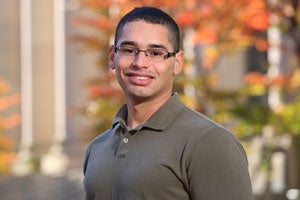Steven Schartup ’13 in a U.S. Army veteran who did two tours of duty in Iraq, one involving combat, and another couple of months in Kosovo in a peacekeeping operation. Since leaving the active Army, he’s been with the National Guard for over three years. Now that he’s at HLS, his one-weekend-a-month of Guard duty, which he serves in New York, is difficult to balance with his 1L studies and time with his wife and son. While he’s entitled to resign from the Guard, Schartup struggles with leaving.
“I feel guilty when I watch the news and see 19-year-old guys going over, and I’m sitting back here enjoying civilian life,” explains Schartup, who was an infantry platoon leader in Kirkuk, Iraq, where his men cleared houses and villages and took at least 100 prisoners, some considered “high value” to the U.S. “The other part of it is, I just like hanging out with soldiers. They’re fun the vast majority of time. Even if they’re doing hard training, they’re a good group. My wife says I’m in a better mood when I do some army training, so she supports me staying in for that reason.”
Schartup’s father was an agribusiness contractor with the U.S. Department of State, so Schartup’s family lived in the Democratic Republic of Congo (DRC), Zambia, Mali, and Egypt, an experience that influenced his decision to serve. “I lived in the DRC when it was Zaire, and I had friends in Rwanda. I felt, growing up, that we needed more military involvement, that it would have helped in Rwanda. When Somalia went poorly, I thought American had made the wrong decision in leaving,” he says.
He joined ROTC as an undergraduate at Cornell; after graduating in 2002, he did his basic training in Ft. Benning, Ga., then deployed to Kosovo with the Second Battalion Second Infantry Regiment, where he was involved with the peacekeeping effort and also helped out with military intelligence operations. His next deployment was for five months in Kirkuk in 2003, where, as a second lieutenant, he led a platoon of 25 men. His men defended buildings in downtown Kirkuk, patrolled the desert around the Kirkuk Air Base, and were responsible for a piece of land near the town of Dibis.
“The platoon leader’s job in combat is to think tactically, to use the terrain, his soldiers, his weapons, to achieve the mission,” Schartup says. After a few months, he was given a sector to control of his own, with 40 villages and two towns including Dibis. There were 150 police officer and 70 Iraqi soldiers in Dibis, and Schartup had the authority to liaise with them as he judged best.
“One time I went to a meeting with group of elders to talk about how they’d set up an interim government to run things until an election,” he recalls. “I didn’t quite understand what their plan was, and they took advantage of the fact I was there to show them that Americans were supporting their plan. Before I had a chance to do anything, they were putting arms around me and taking pictures. At 23 years old, you make a lot of mistakes like that, especially when dealing with elders. They’d been around 60, 70 years — they know a lot. They may not have formal education but they can certainly outsmart someone in their 20s.”
He did a second tour in Baghdad that did not involve combat duty, working as a civil affairs staff officer where he assisted superior officers in directing national civil affairs efforts related to food, fuel, jobs and public services. It was only when he returned to the U.S. that he had time to assimilate his experiences from his deployments. “Leaving a safe house was an adrenaline rush, taking fire was a rush,” says Schartup. “When I got home and I thought about how many risks I’d taken and how many times something could have gone bad, I went through this period where I felt a series of emotions. I didn’t get around to feeling fear until I got home.” Learning of the deaths and injuries of friends was, of course, difficult. “Hearing about these events from home made me wonder why I was fine while they suffered, and made me feel guilty about being back home,” he says.
Schartup, who is attending HLS on the G.I. Bill, applied to law school because he wants a career that makes a difference, and HLS was his first choice. “I felt that Harvard students had more variety in their first job out, and I think that’s because they have more access to varied educational opportunities here.” He is interested in environmental law; his wife, Amina, is getting her Ph.D. in chemical oceanography at the University of Connecticut and caring for their three-year-old son – he sees them on the weekends he doesn’t have Guard duty.
Of his military service, Schartup says, “I liked it. I learned hard lessons. I leave the military believing that I was wrong as teen thinking America should be involved in every little thing. I realize these conflicts are a lot more complicated than anyone would think just from watching the news. So this knee-jerk reaction I had before I served, that America should run around saving the day, I no longer hold that view. The U.S. should be very careful getting involved and should know exactly what it wants to accomplish, and once it accomplishes those things, it should leave.”
Next: Siddhartha Velandy LL.M. ’11, U.S. Marine Corps, Captain »
